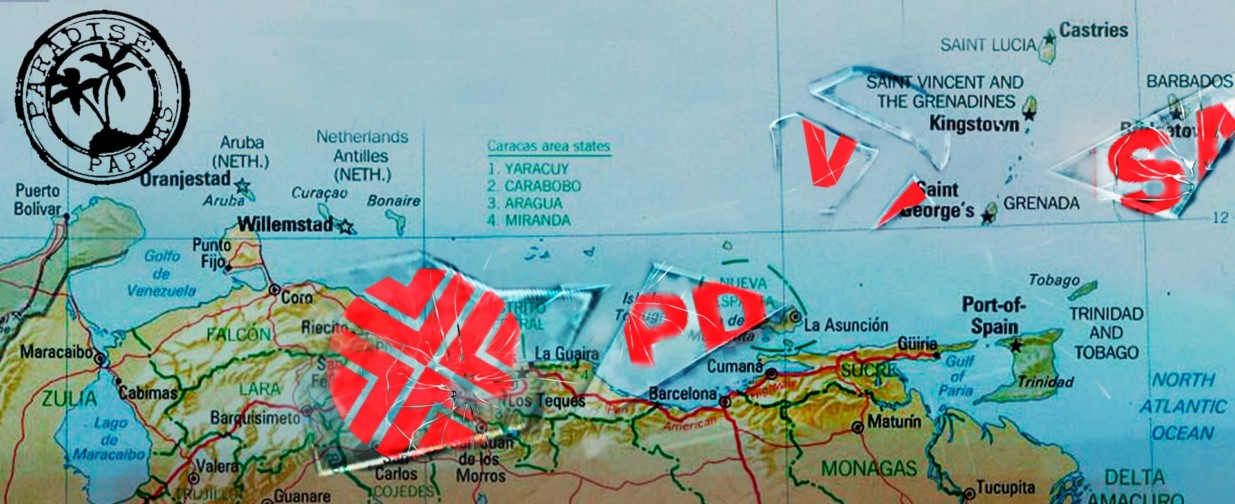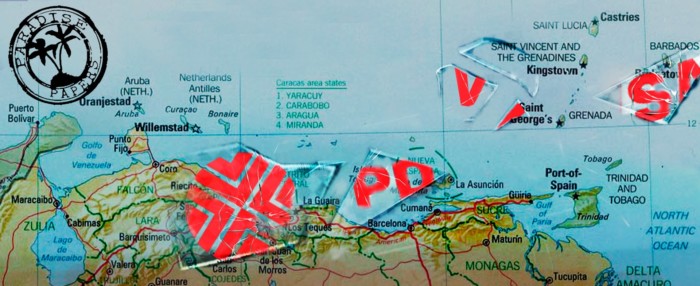

As if they were pieces of a broken mirror scattered in many islands around the world, several offshore companies form an oil-trading business network that reveals the trajectory of Alessandro Bazzoni and Francisco D'Agostino. Both of them, together with the Venezuelan telecommunications magnate Oswaldo Cisneros, landed in 2016 in the Orinoco Belt to fill the vacancy of the original partner, Harvest Natural Resources.
|
Getting your Trinity Audio player ready...
|
"Without a stable market and a fair price, oil investments are difficult," said President Nicolás Maduro in Miraflores, on November 4, 2016. In the televised broadcast, the president broke down, as a trophy, the amount of 10 thousand dollars in private investments announced by Pdvsa, aimed at the Plan Soberano Siembra Petrolera (Oil Sowing Plan), focused on boosting the sharp fall of the state company's production.
A billion of that amount corresponded to Oswaldo Cisneros, the Venezuelan businessman who owns Digitel, who, sitting in front of Maduro, made clear in that afternoon his incursion into the oil world. The presidential assignment was not minor. Cisneros and his share should contribute to triple oil production from wells in Monagas within 5 years.
But Cisneros was not alone there. On the path that led him to the partnership of his company Delta Finance with Pdvsa to promote the creation of the Petrodelta joint venture (of the Orinoco Belt), he was accompanied by Francisco D'Agostino and Alessandro Bazzoni. The former associated with the scandal of the electrical purchases of Derwick Associates with the government of Hugo Chávez, and the later, an unknown Italian businessman.
The signing of the agreement was a surprise to observers of the oil business due to the unexpected incursion of the telecommunications magnate, ignoring the two other entrepreneurs. The case portrays the avid determination of new players, even from other areas, to financially assist Pdvsa and, thus, being part of its businesses by taking the places that traditional partners leave in the country, exhausted from dealing with a declining company and in the midst of a postwar economy.
Neither D'Agostino nor Bazzoni have historical records of professional services in the Venezuelan oil industry. However, their personal information appear in company records in Barbados and Malta, according to documents obtained in a leak from law firm Appleby reported by the German newspaper Süddeutsche Zeitung and shared by the International Consortium of Investigative Journalism, better known as Paradise Papers.
Asked about his oil investments, D'Agostino, who is a member of Daycohost and a member of the board of directors of Banco Occidental de Descuento, as well as the brother-in-law of opposition politician Henry Ramos Allup, claimed that his oil business, Element Capital, was excluded from the PDVSA contracting system and, therefore, does not maintain business with the state company.
Bazzoni
confirmed that he is a minority partner of Petrodelta and adviser to company
Elemento LTD, which "could only market four PDVSA vessels from February to April
2017". He added that his current relationship with D'Agostino is a social
relationship only. Both denied having business with Derwick Associates, accused
in multiple investigative journalism works for having defrauded the Venezuelan
State with the sale of power plants with surcharge.
It is the area of capital consolidation for oil businesses where Bazzoni and D'Agostino are obvious. In 2015, one year before the announcement in Miraflores, Cisneros, D'Agostino and Bazzoni were already in the belt as part of Petrodelta, as directors of Harvest (PDVSA’s original partner in the joint venture), of which they had bought a part and for which they designed a financing plan with the aim of repositioning the Argentine company in Venezuela.
This participation in the business had its cost. It entailed that company CT Energy Holding, controlled at that time by the three partners, according to documents of the Security Exchange Commission (SEC), bought financial notes to Harvest for about 60 million dollars. Then, the total transfer of Harvest (which already wanted to leave the country) was materialized by the Venezuelans who then became direct partners of PDVSA.
On PDVSA’s side, the path was paved. Harvest had years trying to get rid of his society with the state company, which blocked its attempts demanding more capitalization. "Harvest is an example of a partner that does not have the capacity (financially speaking) to invest in the oil business. They only want the dividend, not to invest," Eulogio Del Pino, then president of PDVSA, told to Reuters.
When CT Energy arrived, PDVSA -eager for fresh money- unblocked the path for the company. The businessman of Italian origin tried for several years to enter the oil business in Venezuela and Harvest's eagerness to leave the country was his opportunity. But Bazzoni raised suspicions among PDVSA officials due to his unknown career, according to a former employee of the state oil company. Also, he did not get the financing, until he associated with Cisneros, said the source.
Documents from the Barbados company register reveal a series of offshore companies with names similar to CT Energy Holding, which finally formed with PDVSA the Petrodelta joint venture. Bazzoni and D'Agostino participate in all the companies as shareholders, directors or company controllers. In many cases, only the "last name" of the company changes: CT Energía Holding, CT Derivatives Corporation and CT Energía Oil and Gas LTD. Some, like CT Energy Holding SRL, have headquarters in Las Mercedes, in the Daycohost building, the company owned by the D'Agostino family.
Others are in Malta and Barbados. England is another location for two joint ventures, Elemento Solutions Limited and Elemento Services Limited. The records indicate that the nature of the companies is the purchase and sale of oil. Cisneros does not appear in them but the partnership of D`Agostino and Bazzoni in CT Energy Holding sealed the financial agreement with Harvest in June 2015 and it entered as a member of PDVSA in Petrodelta in November 2016.

In the meantime, several of Bazzoni's previous partners in oil financing businesses (Centauro, Chemoil, Saltpond and Imperial Energy Ventures) opened consultations in anti-fraud courts in Texas and New York, targeting Italian offshore companies due to diversion of funds, breach of contract and failure to comply with of jurisdiction agreements. One of them requires compensation for damages of up to 21 million dollars.
From Barbados, the fall of Bazzoni reached New York. On the Caribbean island, the entrepreneur had incorporated a company called Cinque Terre Financial Group, and a judge ordered liquidation thereof in April 2016 for insolvency and debts. However, the liquidator of Barbados noted that although the liquidation process had begun, Bazzoni opened subsidiaries of the Cinque Terre (peculiarly with the name of CT Energía LTD), both on that island and in Malta.
For the moment, almost nothing is known about the productivity of the alliance between PDVSA and these partners. More than a year after sealing their commitment to boost production, it is a mystery if these unconventional allies who formed Petrodelta contributed to the Oil Sowing Plan.
Since its opening in 2017, the Porsche Design Tower quickly became a symbol of luxury and ostentation in South Florida. Magnates from all over the world retreat behind the discretion of its tinted glass windows and virtually anonymous legal entities. But in recent days, two police investigations into illegal financial flows from abroad placed the building under an inconvenient spotlight. The justice just seized an apartment of over five million dollars from a Venezuelan agent.
The judicial authorities of Switzerland found a connection between the wife and the mother-in-law of the former Venezuelan minister with at least 40 million dollars deposited in eight bank accounts, one of which was shared with one of the main negotiators of bribes and kickbacks between Odebrecht and the governments of Chávez and Maduro. Although they asked the Venezuelan justice to investigate the matter, the courts denied any possibility of addressing the case and the Venezuelan Prosecutor's Office, led by Tarek William Saab, acts as if not aware.
The Venezuelan government has resorted to a myriad of trading intermediaries to provide imported merchandise for the Claps, its star food aid program. With massive purchases in international markets, it poorly satisfies the hunger of popular sectors while safely feeding the financial flows that end in bank accounts in Hong Kong or Switzerland.
Hurried by the drop of oil prices and the collapse of oil production, Nicolás Maduro bets on the Orinoco Mining Arc as a formula to increase the resources that are so scarce in the national coffers. Under the "joint venture" system, the Government has ended up agreeing with companies insufficiently known in the extra-activist industry, like Corporación Faoz. Among the beneficiaries is Gold Reserve, the Canadian mining company that Hugo Chávez expelled from Venezuela years ago. The Paradise Papers filtering shows that both have registered companies in that tax haven called Barbados.
Aside from ethical questions, the logic of a private entity opening an offshore company seems elementary —to declare its profits in a territory where it can pay less tax than it should in its place of origin. But when it comes to a state-owned company like Petróleos de Venezuela, which is not obliged to pay taxes - and therefore does not need to evade them - it is difficult to understand why within its business scheme there is contracting with companies established in tax havens and there is even the creation of their own subsidiaries in these places. What does the Venezuelan public treasury gain from this?
The member of the US Cabinet, Wilbur Ross, is one of the owners of a company that provides maritime transport services to Pdvsa, a client that in 2015 contributed over 11 percent of the profits to his shipping company. Although the official had to get rid of his mercantile properties to hold his position, he kept a participation in that line of business through a complex offshore structure in the Cayman Islands. Thus, he did not only do business with chavista Venezuela, but also with an associate of Russian President Vladimir Putin. Both countries are subject to economic sanctions by Washington.
When Vice President Delcy Rodríguez turned to a group of Mexican friends and partners to lessen the new electricity emergency in Venezuela, she laid the foundation stone of a shortcut through which Chavismo and its commercial allies have dodged the sanctions imposed by Washington on PDVSA’s exports of crude oil. Since then, with Alex Saab, Joaquín Leal and Alessandro Bazzoni as key figures, the circuit has spread to some thirty countries to trade other Venezuelan commodities. This is part of the revelations of this joint investigative series between the newspaper El País and Armando.info, developed from a leak of thousands of documents.
Leaked documents on Libre Abordo and the rest of the shady network that Joaquín Leal managed from Mexico, with tentacles reaching 30 countries, ―aimed to trade PDVSA crude oil and other raw materials that the Caracas regime needed to place in international markets in spite of the sanctions― show that the businessman claimed to have the approval of the Mexican government and supplies from Segalmex, an official entity. Beyond this smoking gun, there is evidence that Leal had privileged access to the vice foreign minister for Latin America and the Caribbean, Maximiliano Reyes.
The business structure that Alex Saab had registered in Turkey—revealed in 2018 in an article by Armando.info—was merely a false start for his plans to export Venezuelan coal. Almost simultaneously, the Colombian merchant made contact with his Mexican counterpart, Joaquín Leal, to plot a network that would not only market crude oil from Venezuelan state oil company PDVSA, as part of a maneuver to bypass the sanctions imposed by Washington, but would also take charge of a scheme to export coal from the mines of Zulia, in western Venezuela. The dirty play allowed that thousands of tons, valued in millions of dollars, ended up in ports in Mexico and Central America.
As part of their business network based in Mexico, with one foot in Dubai, the two traders devised a way to replace the operation of the large international credit card franchises if they were to abandon the Venezuelan market because of Washington’s sanctions. The developed electronic payment system, “Paquete Alcance,” aimed to get hundreds of millions of dollars in remittances sent by expatriates and use them to finance purchases at CLAP stores.
Scions of different lineages of tycoons in Venezuela, Francisco D’Agostino and Eduardo Cisneros are non-blood relatives. They were also partners for a short time in Elemento Oil & Gas Ltd, a Malta-based company, over which the young Cisneros eventually took full ownership. Elemento was a protagonist in the secret network of Venezuelan crude oil marketing that Joaquín Leal activated from Mexico. However, when it came to imposing sanctions, Washington penalized D’Agostino only… Why?
Through a company registered in Mexico – Consorcio Panamericano de Exportación – with no known trajectory or experience, Joaquín Leal made a daring proposal to the Venezuelan Guyana Corporation to “reactivate” the aluminum industry, paralyzed after March 2019 blackout. The business proposed to pay the power supply of state-owned companies in exchange for payment-in-kind with the metal.